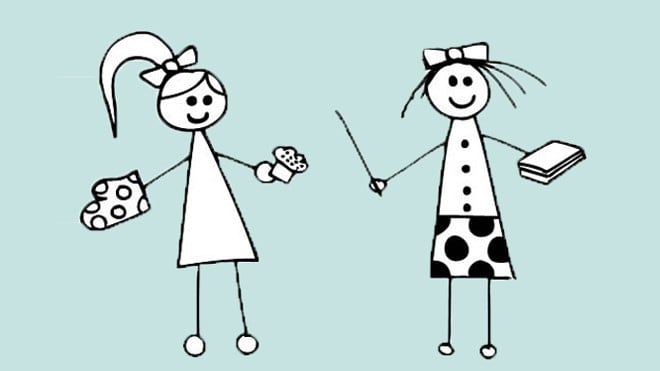
We learn about how to be in business from the girls themselves

"Before I married, I had six theories about bringing up children, but no children; now I have six children and no theories"
-- John Wilmot,
Second Earl of Rochester
Parents to daughters, Suhani aged, 13 and Falisha 11, we may be relatively young in experience, but have come some way -- in terms of air miles, schools and teachers -- Pakistani, Indian, Sri Lankan and Filipino, to identify a few. But mostly, we now learn about how to be in business from the girls themselves. Who knows someday, in the future, we might be forced to break path with an account pivoted on role reversal. After all, Falisha used to sing Mein Tenu Samjhawan Ki (How Do I Make You Understand) with some lilt at 5, whilst adding Turkish, English and Urdu songs to the repertoire.
Now 11, last week, she questioned her mom about why we were not more effusive with PDA (public display of affection); even suggesting it was the ‘romantic thing to do’!
We did have the benefit of own experience (as kids to our parents) to start with, but it soon dawned that we would have to constantly adapt and innovate. Children are born for a different age -- a world which will not necessarily mirror ours when they grow up, and which is where we tend to make a mistake in trying to sometimes, unwittingly, cast them in our mould.
But we did stick to a few core ideas and values that helped us navigate the phantasmagoria of life. As siblings, we had benefited a great deal from travelling with my father serving in diplomatic missions abroad. So the first thing we did as parents when we went scouting for schools in Islamabad was to try to find one where ideally, they would mix with students of different ethnic, cultural and even international backgrounds.
We hit the straps at one which had more than a dozen nationalities. I’ve always felt there’s an opportunity there to set in motion ingredients for a more rounded personality in later life. Both the girls had an early chance at integration and embracing diversity.
I and my wife continue to balance out the parent equation: she’s the ‘benevolent dictator’ in drawing the line, and I’m admittedly, ‘anti-establishment’ (loathe to social conditioning). I happily stand accused of allowing our kids ‘too much’ freedom to do their thing, and yet report excellent academic results, which is great given we’ve never pushed the kids to the edge like some parents do.
Read also: Editorial
The freedom regime is rooted in openness. Both my wife and I are close friends to our daughters. When the younger one came to me early last year armed with the right biological conclusion of how babies come into the world, I chose not to turn the clock back. It left my wife slightly bemused, but I assured her it was a better choice than having to set up a Truth and Reconciliation Commission later on!
We also watch age appropriate films together, in the cinema and at home. I have seen them develop a very good sense of judgement because of it -- besides a taste for the arts. Both can review work remarkably well, with a critical mien to boot. They can, as a result, also fictionalise with flair when writing stories and essays.
Tools are important, too. There can be a never-ending argument about how much of an indulgence say, an iPad or notebook is, or isn’t. But then again, a degree of freedom for both educational and entertainment purposes, have served the kids very well in our case. The one sticking point remains their desire to own a smartphone, which is one territory, where we don’t want them to go just yet.
Talking of tools, just as important is providing them with the means for mental and physical growth. Recreation, sports in particular, must be encouraged in a gender-free realm. Though our older one is more inclined to arts as a medium, her sibling has defied the odds, including a doctor’s advice for her not to indulge "boys’ sport" after a freak injury at football. She made sure to reinforce the possible, slamming five goals, no less, in her first field encounter three years ago against a boys’ team at school! She has also won regularly at athletics, and tried her hand at handball and cricket, too.
It has helped, of course, that they have followed the mantra "what men can do, women can do better" as an advice. A couple of years ago, Falisha questioned the notion, in a classroom discussion on gender roles, where the teacher alluded to the idea of strength as being a male preserve. Citing the examples of Benazir Bhutto and Malala Yousafzai, she argued that "strength lay in character and idea, and therefore, it was wrong to assume physical strength as the fount of power".
On another occasion, Suhani drew my attention to the absence of a female panelist on Geo News’ show, Report Card, as being "unfair and unrepresentative of nearly half the country’s population". Wonder if my subsequent social media post on this score led to a course correction because Marvi Sarmad became a regular presence in its wake!